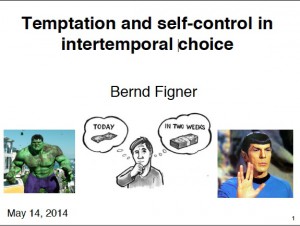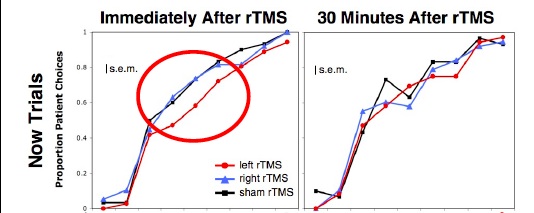Hello! I recently heard a talk about something called intertemporal choice, which is a fancy label for delay discounting, which is a fancy label for people’s tendency to value immediate rewards over long-term gains, even though the latter are objectively more valuable. Here’s a simple description from the first few lines of a scientific article:
Humans and animals prefer immediate over delayed rewards (delay discounting). This preference for smaller-but-sooner [SS] over larger-but-later [LL] rewards shows substantial interindividual variability in healthy subjects. Moreover, a strong bias towards immediate reinforcement characterizes many psychiatric conditions such as addiction and attention-deficit hyperactivity disorder.
—Peters and Buchel, Trends in Cognitive Sciences, May 2011, Vol. 15, No. 5
So addicts go after smaller-but-sooner (SS) rewards more than larger-but-later (LL) rewards…more than “normal” people do. You probably knew that, especially if you are or were one. And I’ve posted about it and talked about it ad nauseum.
One interesting question: were we already like that and that’s why we became addicts? This SS/DD overdrive is related to other personality traits, like, oh, impulsivity. Or does being an addict gradually wear away our cognitive controls, reflective skills, etc? Until there’s nothing holding us back from I want it now! I think both are true, in different proportions for different people. I’ve seen some pretty well controlled people fall into addiction, and they weren’t so well controlled after a year or two.
 In this talk, a colleague named Bernd Figner (I know, it sounds like Burnt Finger — how else do you think I remember it?) talked about an experiment using transcranial magnetic stimulation (TMS). Basically, you put an electromagnet right on the person’s scalp, over the part of the brain you’re interested in, and turn it on. And the effect is that that part of the brain becomes discombobulated. The magnetic field causes it to become disorganized. Temporarily. So he put his TMS device over the top-side (dorsolateral) part of the prefrontal cortex. And when he did that, people’s tendency to go
In this talk, a colleague named Bernd Figner (I know, it sounds like Burnt Finger — how else do you think I remember it?) talked about an experiment using transcranial magnetic stimulation (TMS). Basically, you put an electromagnet right on the person’s scalp, over the part of the brain you’re interested in, and turn it on. And the effect is that that part of the brain becomes discombobulated. The magnetic field causes it to become disorganized. Temporarily. So he put his TMS device over the top-side (dorsolateral) part of the prefrontal cortex. And when he did that, people’s tendency to go  for the SS reward increased significantly. Especially when he did it on the left side of the head: the left hemisphere does a lot of our thinking for us. Cool. Cognitive control helps us keep those SS rewards at bay while we work toward the LL rewards, like having a life, a wife, a bank account, etc. And the finding might pull for explanation #2: that addiction itself (which depletes cognitive-control on the spot) increases delay discounting. A vicious circle if ever there was one.
for the SS reward increased significantly. Especially when he did it on the left side of the head: the left hemisphere does a lot of our thinking for us. Cool. Cognitive control helps us keep those SS rewards at bay while we work toward the LL rewards, like having a life, a wife, a bank account, etc. And the finding might pull for explanation #2: that addiction itself (which depletes cognitive-control on the spot) increases delay discounting. A vicious circle if ever there was one.
Another interesting thing: look at the graph: the effect disappears 30 minutes after the TMS application. In other words, your brain can go back to normal within 30 minutes of whatever it was that interrupted self-control. Which might include drug cues, thinking about drugs or booze, craving, driving toward the liquor store or your dealer’s house… Turn around and drive home, and you should have your brain back within half an hour.
Then Dr. Figner reported on experiments in which they adjust two parameters: The first is the value of the SS and LL rewards. They often use money with adult subjects, so all they have to do is increase the amount you receive after waiting, or reduce the amount you receive in the short term. The second is the time interval. If you can increase the waiting time for either the SS or LL rewards, people’s choices will change also. So some researchers look for the break-point for their subjects. Let’s say you offer me 10 euros today vs. 20 next week. I’ll take the 10 today, thank you. But you increase it to 45 euros next week, and I’m willing to wait. Or if the immediate reward gets less immediate, and I have to wait for the SS payoff for a few hours, then I’m more likely to wait for the bigger payoff next week. But a month? Maybe not.
So by adjusting the value and the timing, you can find the point at which any person will switch from choosing the sooner payoff to choosing the later payoff. Now if you’re an addict, or you’re working with addicts, think about whether this might help. Make the long-term benefits more valuable. Not only will your wife give you back a key to the house, but she will make you your favourite dinner on Tuesday evening, if you don’t get loaded tonight. Or make it sooner. She’ll do that for you tomorrow. Or delay the “immediate” reward. You can do this with self-programming (see recent posts). Get rid of all the booze in the house, so you have to walk four blocks to get some.
See my point? An important strategy for overcoming addiction might be to fiddle with these parameters: how much, how high, when’s it coming? Versus how good will it be, how long do I have to wait? Fiddle with them until the value of the future matches and exceeds the value of getting high today. It’s like saying: Everyone has their price. But instead you’re saying: Everyone has a point at which sanity returns.


Leave a Reply to Dustin John Cancel reply